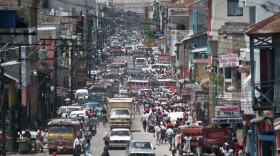When Mexicans migrate to the United States, many leave their children in the care of extended families. That's causing problems back in their home communities, with children doing poorly in school, dropping out or turning to crime.
In the rural village of San Andres Nicolas Bravo in the province of Malinalco, Alexis Silva Carreno, 14, has nearly been expelled from school several times. He says his troubles can be pinpointed to the day in 2001 when his father left for the United States.
Alexis began drinking and hanging out with friends who were part of a local gang led by Mexican youths who had grown up in the United States. He started doing drugs and was eventually sent to a state home for troubled kids.
He was left in the care of his grandmother and extended family. But it didn't help how he felt.
"I felt discriminated against, like I was worth nothing, like trash," Alexis says.
According to the headmistress of his school, Alexis' story is far from uncommon. Antonia Figaroa Ibanez says that more and more parents are leaving their children behind to be cared for by relatives.
"It's affecting us hugely," she says. "Out of 73 children in one class, 10 have neither of their parents here. That's a big number."
In a town near Malinalco, teacher Carmen Sanchez says that when a child's parents leave, there is a clear consequence.
"When they don't have their father or mother, they lack confidence ... in the academic sphere," she says. "It means that they will be more likely to miss school and to drop out. They are also less respectful of their grandmothers or uncles or their teachers."
Ellen Calmus works with Proyecto El Rincon (The Corner Project), which helps the children of migrants in Malinalco. She says that because crossing the border illegally has become more difficult and costly, migrants don't want to risk returning to see their families.
That has meant that many of their children are now going north, unaccompanied, to reunite with their parents instead.
Alexis Silva Carreno says that his father has returned from Texas. And now the boy has stopped drinking and hanging out with the gangs.
Still, there's been more trouble at home. Now, he says he, too, is thinking of going north.
Copyright 2022 NPR. To see more, visit https://www.npr.org.





